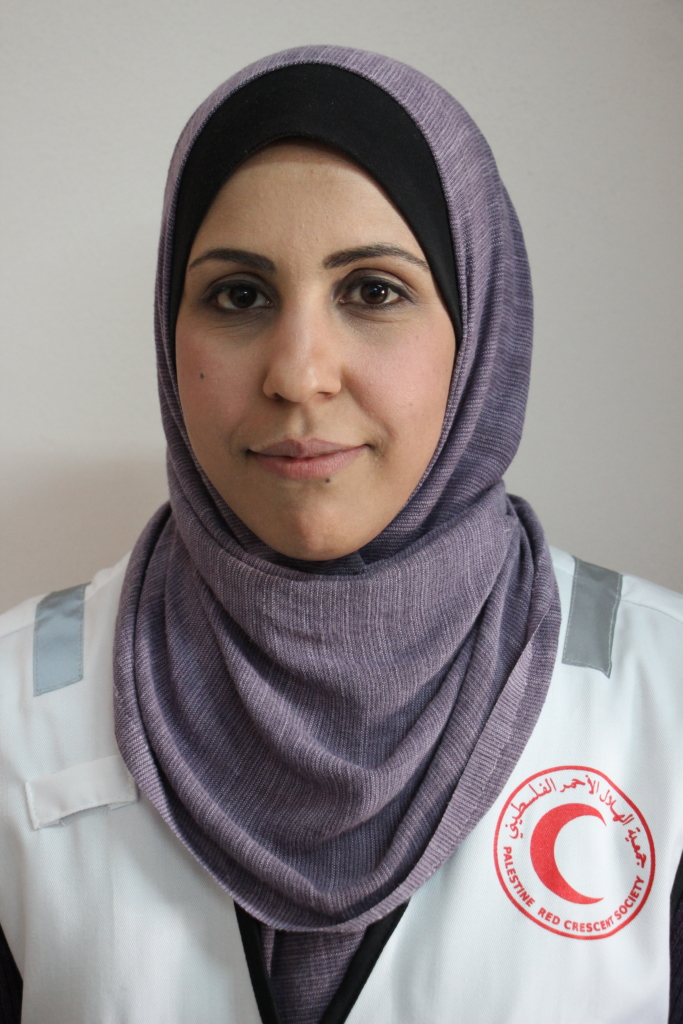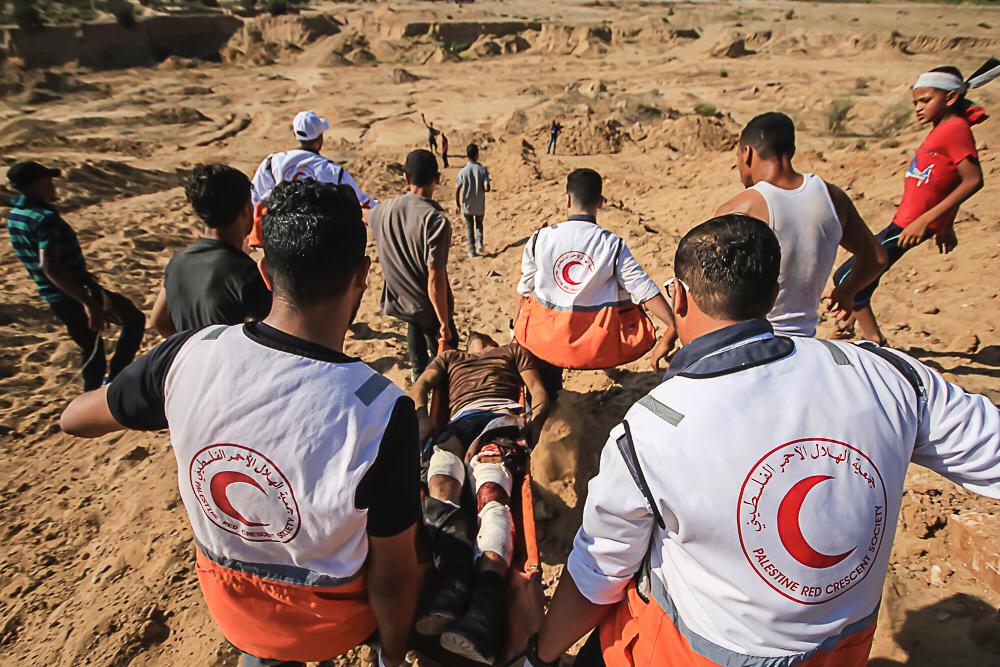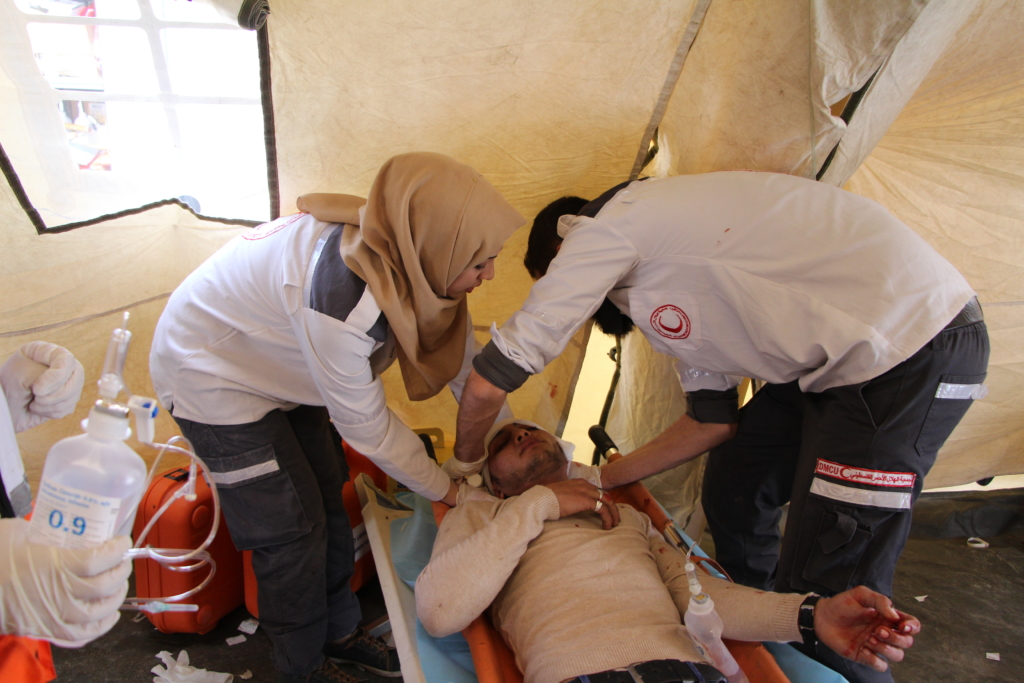Guardians of Gaza: The Humanitarian Efforts of the PRCS Volunteers
https://chat.whatsapp.com/AmbulanceTodayDirect
An Interview with Israa Azzam, Palestine Red Crescent Society Volunteer

in conversation with
Israa Azzam (pictured),
Volunteer Paramedic with the Palestine Red Crescent Society.
Published in Ambulance Today,
Issue 1, Volume 16,
Spring 2020: Global Warning and the Burning Issues at the Core of Prehospital Trauma Care
Following on from the introductory interview we did with the PRCS in our last edition of Ambulance Today, which was specifically dedicated to voluntary EMS around the globe, we are happy to present the second interview which we also undertook with Israa Azzam.
Israa is a voluntary EMT based in Gaza and it is our hope that the two interviews offer an accurate understanding of EMS in Palestine when put together and compared.
Joe Heneghan: Israa, at what point in your life did you personally decide to become a paramedic in the first place? What led you to make this decision?
Israa Azzam: I am passionate about serving my community and providing humanitarian services to those in need.
This passion drove me to volunteer as an emergency medical technician (EMT).
The PRCS offered me the opportunity to take part in a First Responder course which I joined in order to be better prepared to face Israel’s continuous attacks on the Gaza Strip and because we need EMTs to be ready to operate at all times.
My first assignment was during the March of Return protests along Gaza’s borders in 2018.
The PRCS is a widely accepted and well-known organisation.
It allows both men and women to join its ranks as volunteers, and endeavours to ensure a rapid response to emergencies. All that plus my desire to assist other people is what drew me to the PRCS in the first place.
J.H: Whilst you mention that PRCS take both male and female volunteers, what has your experience been as a woman working in EMS in Palestine?
Israa: I noticed a huge change on the personal level. The First Responder training course made me more capable of taking decisions and helped me develop a strong personality.
Through it, I gained experience relating to First Aid and assisting the sick and wounded. It also encouraged me to pursue an emergency and disaster response degree.
My family did not object to the path I chose. On the contrary, my relatives stand by me and encourage me to persevere as an EMT in order to assist fellow Palestinians.

This image featured as the front page in Ambulance Today’s Winter 2019 edition.
J.H: So, how long have you served with the PRCS? What route has your time with the PRCS taken?
Israa: I started serving with the PRCS in 2016, so for about four years.
I was preparing a Master’s degree in Disaster and Crises Management at the Islamic University when I joined the PRCS as a volunteer.
I took part in a First Responder course offered by PRCS in which I learned how to deal with injuries and bleeding as well as how to provide First Aid and mitigate risks.
I can now respond to all types of emergencies. I have already taken part in response efforts during the March of Return protests and during the latest escalation in the Gaza Strip in November 2019.
J.H: And how would you describe working as a volunteer for the PRCS during that time? How does it feel, what do you personally get out of it?
Israa: Despite the difficulties and risks I face as an EMT, especially in times of war, working with the PRCS is a great experience.
We work as one team and I feel that all EMTs are part of the same family. This great working environment makes me feel happy and helps me accomplish tasks with more ease.
Working as an EMT helped build my esteem and made me feel accomplished. It also boosted my community engagement and my desire to provide humanitarian services.
J.H: And what would you say are perhaps the biggest barriers to you delivering emergency care on a day to day basis then?
Israa: The PRCS is a National Society that aspires to provide humanitarian services to all those in need.
It respects the fundamental principles of the International Movement including neutrality, impartiality, humanity and universality.
Although International Humanitarian Law calls for the respect of medics at all times, there are constant violations committed by Israeli occupation forces against our medical mission, including the non- respect of the Red Crescent emblem.
For example, tear gas was fired at me in the line of duty and a tear gas canister was directly fired at the ambulance I was in while covering the March on Return protests.
J.H: That is indeed a great difficulty to face and opens the need for further international discussion on so many levels.
Whilst recognising the severity of such occurrences, the complexities of such a discussion are genuinely far too myriad to delve into here.
However, I must ask: what keeps you going in the face of that type of personal danger?
Israa: What makes me continue despite all barriers is the happiness I see on the faces of the people I help.
J.H: There is, as they say, beauty in simplicity. Moving on, what is it like to work in the Gaza Strip? How are you received by members of your community, especially when in uniform?
Israa: Members of my community treat me with respect, trust and appreciation. They fully understand that I represent a National Society that provides them with humanitarian services.
They trust the PRCS and respect its uniform and emblem. They also know that they can turn to the PRCS and seek its help during emergencies.
J.H: Such deserved recognition must justifiably serve as a source of some pride. Simple recognition, support and thanks from a community go a long way in EMS.
Speaking of pride, what are you proudest of when you come home after a day of serving people in emergencies, offering them treatment and comfort?
Israa: I am proud to be an EMT and to help others during emergencies. It is an honour for me to be a volunteer first responder with the PRCS.
When I return home after my shift ends, I start remembering all the events of the day, including the sad ones, and I try to cope with the sadness in order to continue providing assistance to those who need it.
One of the most difficult moments for me was when I received a call as I was tending a casualty during the March of Return protests informing me that my brother was shot in the foot.
Another difficult moment was when I learned that the wounded person I had treated earlier at one of the PRCS’ medical posts had died at hospital.
Then I learned that he was the brother of a colleague who was also tending the wounded that day at the same medical post.
J.H: So, to offer solace and care during such difficulty serves as a source of drive for you instead. That’s understandable.
Are there any organisations within Palestine which can help you cope with such experiences? Trying to handle that burden alone can be a very difficult, and even destructive, thing.
Israa: The PRCS has a Psycho-Social Support department which offers psychological support to the Society’s EMTs and volunteers.
With the help of specialized teams, they listen to us, offer us advice and provide us with training on how to be in control of our emotions and how to release pent-up stress after a long day of field work where we race to save lives
J.H: Do you feel that a voluntary position within EMS has added to you as a person then?
Israa: I have no doubt that volunteering has added a lot to me as a person.
It’s made me better prepared for emergencies and helped me obtain a Master’s degree in Crises and Disaster Management.
My thesis was on the Role of paramedics in responding to crises and disasters and their impact on service quality.
J.H: One of the questions I asked Saleem, a fellow PRCS medic, in the last interview was what he would add to the service if he had the chance?
So, again, if you could just wave a magic wand and receive as many things as you thought necessary to better the delivery of EMS in Palestine, what would they be?
Israa: If I could wave a magic wand, I would ask for the following:
- Protecting medical teams, respecting the emblem and preventing all violations against them in line with IHL [International Human Law] provisions;
- Ending the suffering in the Gaza Strip so people can live in peace and security;
- Teaching First Aid to school children as part of their curriculum;
- Providing First Aid training for the maritime environment given the frequent clashes between occupation forces and Palestinians along Gaza’s shores.
J.H: Very interesting answers offering much food for thought, thank you.
Do you find that the PRCS receive any aid from the PLO, or perhaps a less centralised political body within Palestine? Do you receive support from outside of Palestine at all?
Israa: The government of Palestine provides support to the PRCS as it happens in other countries. The Society also receives support from RCRC [Red Cross Red Crescent] constituents and from international humanitarian bodies.
J.H: And as an emergency service offering vital humanitarian aid, do think that you are given enough support politically from either inside or outside of Palestine?
Israa: The support we receive is insufficient given the great risks and violations committed against medics and the emblem in blatant violation of IHL [International Human Law].
J.H: At a guess, what types of calls would you say you see the most in your area?
Israa: Most calls have to do with car accidents, hypertension and heart conditions.
J.H: Do you think that anything can possibly done to alleviate this?
Israa: Yes. Penalties can reduce traffic infringements and decrease accidents.
On the other hand, hypertension and heart conditions are due to difficult living conditions in the Gaza Strip. Offering patients psychological support could help reduce stress and distress levels.
J.H: Well I sincerely hope that such ideas can be taken forward.
Getting back to the nature of voluntary EMS, do you perceive any differences between those who undertake voluntary EMS as a vocation and those who serve in employed positions?
Israa: Yes, the work I do as a volunteer EMT differs from what professional EMTs do.
They are more experienced and better capable of dealing with emergencies, handling challenging situations and coping with stress.
They face grave risks in order to assist others and have been well trained to become professional EMTs. As for me, I feel that this is just the beginning.
I still need to learn a lot from my professional colleagues in order to gain the experience they enjoy and to enhance my emergency-response skills, especially in wartime.
J.H: What do you do outside of serving with the PCRS? If this is a voluntary position, you must make your living through some other means?
Israa: I used to work as a teacher in a public school. Now, I have more time for my voluntary work at the PRCS. The unemployment rate is very high in the Gaza Strip because of Israeli occupation and the political situation.
J.H: I’m sorry to hear that. Similarly, how do you find the time to devote yourself to helping others and to regular training etc. in between your other personal duties in life?
Israa: I try to find the right balance between my work as a volunteer and my personal life.
I allocate two days every week to my voluntary duties at the Gaza EMS Centre and to tending those wounded during the March of Return protests. I also stand ready at all times to respond to emergencies.
J.H: Would you recommend volunteering in EMS to anyone else?
Israa: I would certainly advise anyone who has the capacity and qualifications to volunteer in EMS. Volunteering is an altruistic and humane activity that saves lives, serves society and builds ties between people.
J.H: And what advice would give to those hopeful volunteers then?
Israa: I would advise them to become perseverant volunteers and to use their free time to serve their society.
Volunteering offers great opportunities and is a wonderful way to provide humanitarian services to your community.
J.H: Israa, thank you for such candid and forthright answers. The glimpse you have offered into life working in EMS around Gaza has been fascinating, provocative and offers a foreground for much deeper continuing conversation.
I hope you continue to gain as much from your tireless voluntary emergency care as your community and patients do.
Quality content
- Casinos Not On Gamstop
- Casinos Not On Gamstop
- Casino Sites Not On Gamstop
- Non Gamstop Casino
- UK Online Casinos Not On Gamstop
- Casino Sites Not On Gamstop UK
- Casino Sites Not On Gamstop
- Games Not On Gamstop
- Sites Not On Gamstop
- UK Online Casinos Not On Gamstop
- Casino Not On Gamstop
- Slots Not On Gamstop
- Casino Not On Gamstop
- Gambling Not On Gamstop
- Casinos Not On Gamstop
- Non Gamstop Casino
- UK Online Casinos Not On Gamstop
- Casino Sites Not On Gamstop
- Best Betting Sites
- Best UK Online Casinos
- New Horse Racing Betting Sites









Leave a Reply
Want to join the discussion?Feel free to contribute!